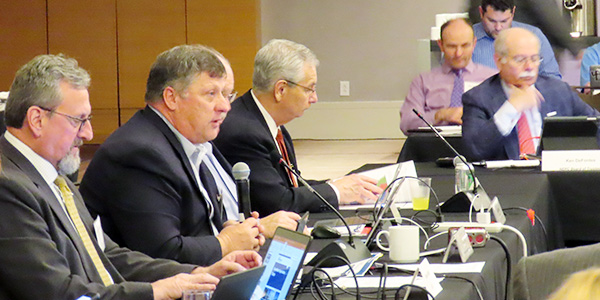NERC’s Reliability and Security Technical Committee (RSTC) held a special meeting Wednesday to wrap up unfinished agenda items from its last meeting in September, when it ran out of time because of an extended debate over a plan for taking over the work of the disbanded Planning, Operating and Critical Infrastructure Protection committees. (See NERC RSTC Briefs: Sept. 15, 2020.)
SITES Revisions Underway
The issue that caused the most contention at the September meeting was the scope document for the Security Integration and Technology Enablement Subcommittee (SITES), intended to recommend “practices for incorporating cyber and physical security aspects” into utilities’ business activities. Several participants expressed surprise at the focus on cybersecurity at the expense of transformative business applications, which they had understood to be the goal of the subcommittee. The document was tabled for further discussion.
RSTC Vice Chair David Zwergel, of MISO, asked for volunteers to help revise the document, with the goal of bringing it back to the committee for approval at its next meeting in December. Kayla Messamore of Evergy, ERCOT’s Christine Hasha and Carl Turner of Florida Municipal Power Agency agreed to take part in the revision process.
Consent Agenda Items Approved After Debates
The RSTC’s business for this meeting primarily consisted of items from the previous meeting’s consent agenda that were pulled for further discussion because of a motion by Brian Evans-Mongeon of Utility Services Inc.:
- Standard authorization request (SAR) for MOD-025-2 — Unit verification and modeling.
- SAR for revisions to PRC-023-4 — Transmission relay loadability.
- Reliability guideline: Gas and electrical operational coordination considerations — posting for 45-day comment period.
- Reliability guideline: Distributed energy resource verification — posting for 45-day comment period.
- White paper on assessment of DER impacts on NERC reliability standard TPL-001.
All items passed, with the exception of the reliability guideline on gas-electric coordination. The guideline was remanded to the Operating Reliability Subcommittee on a motion by Evans-Mongeon, who argued that NERC’s Electric-Gas Working Group deserved a chance to provide input into the resolution before it was passed.
Another dispute emerged during the discussion on the SAR for MOD-025-2, when Duke Energy’s Greg Stone moved that a provision in the document’s scope section calling for data to be “analyzed and used properly by transmission planners and planning coordinators” be removed, on the grounds that the language was not clear. However, his motion was defeated, with several members arguing that editing a SAR is not the committee’s purpose and that if the wording was vague, then it could be addressed by stakeholder comments.
Evans-Mongeon also questioned the white paper on assessment of DER impacts to TPL-001, calling it premature in light of the fact that the System Planning Impacts from Distributed Energy Resources (SPIDER) Working Group is working on another white paper covering DER impacts to the rest of NERC’s standards that could be released as early as December. He moved for the paper to be held so that a more thorough evaluation of DER impacts to all reliability standards can be completed.
In response, SPIDER Chair Kun Zhu, of MISO, explained that the group had already done “thorough homework” on TPL-001 and felt there was no reason to delay its analysis until work on the other standards was completed, when releasing the results earlier might help achieve a more reliable system. This view was supported by most other members, and the white paper was endorsed by the committee.
Committee Feels Growing Pains
Part of Wednesday’s meeting was taken up with complaints about procedural quirks of the new committee. Several members expressed surprise upon learning that approval of motions required a two-thirds majority of all members present, as opposed to all members voting. Turner and Evans-Mongeon raised questions about whether votes at previous meetings had been recorded properly, as they had assumed that approval only required a simple majority.
Several members also said the procedure currently used for initiating debate on a proposal, which requires a motion and a second in favor of the proposal, is unnecessarily confusing as members may not be aware that the motion is opening debate rather than beginning a vote. Chair Greg Ford, of Georgia System Operations, promised that the committee would consider revising its procedures with an eye toward clarity.






